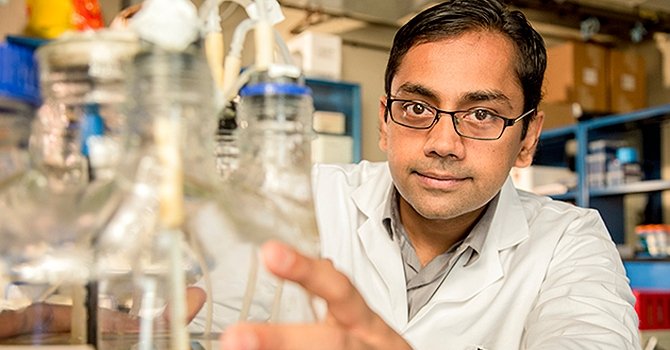UConn Alum Wins “Genius Award” for Converting Wastewater into Energy, Fertilizer

UConn alumnus Kartik Chandran ’99 Ph.D sees sewage as an enriched stream that can be harvested and used to help solve some of the world’s most pressing problems. Chandran, an environmental engineer, recently won a prestigious MacArthur Fellow, commonly known as a “Genius Grant,” for his work using microbes to convert wastewater into fertilizer, chemicals, energy, and clean water.
“Wastewater traditionally has been viewed as something negative—something that we need to get rid of. To me, wastewater streams are not just waste streams, they are enriched streams,” he said in a video released by the John D. and Catherine T. MacArthur Foundation.
Chandran began working on the foundation of his current work as a doctoral student in UConn’s engineering department. There, he worked on understanding and mathematical modeling of the nitrogen cycle and to find ways to reduce nitrogen discharges from wastewater treatment plants. Traditionally, these treatment plants remove pathogens and organic carbon, but could discharge nitrogenous pollution into receiving water bodies such as lakes, streams and oceans. These plants also require energy and resources to operate, and if not operated well, could release harmful greenhouse gases into the air. Recognizing such limitations, he wanted to find a greener solution.
“We want clean water, but at a lower resource footprint, especially when resources are not available,” he said.
Recycling pollutants
Using microbial ecology, molecular biology, and engineering, he is working to develop more sustainable treatment technologies that do more than simply remove pollutants. He uses and engineers microbial communities to reuse the waste and turn it high-value products, including biodiesel, which could be used to run the treatment plant. In addition, he is working to remove nitrogen from the waste streams while minimizing the release of nitrous oxide, a greenhouse gas.
Chandran is one of 24 MacArthur Fellows for 2015. The $625,000 fellowship, known as a “genius grant,” is given to artists, scholars, and others who show exceptional originality and dedication to their work and a remarkable capacity to be self-directed.
Chandran, 41, an associate professor in the Department of Earth and Environmental Engineering at Columbia University, also came up a similar creative solution for a rural town in Ghana. Working with his Engineers without Borders students, he re-engineered toilets to both provide sanitation and recover nutrients to be used in agriculture. He has also recently concluded a pilot program in Kumasi, Ghana, to transform fecal sludge into biodiesel to achieve resource-efficient sanitation.
Started in a UConn lab
Originally from Delhi, Chandran graduated from the Indian Institute of Technology in Roorkee, India. He came to UConn in 1995 and was immediately taken with the academic culture.
“I think it’s just a very nice atmosphere that fostered research, thought, creativity, and imagination. I recall those memories very fondly,” he said.
His former advisor at UConn, Barth F. Smets, said Chandan eventually moved from doing experiments in the lab to working on full-scale wastewater treatment plants. With funding from the Long Island Sound research fund, he worked on minimizing nitrogen discharges from a wastewater treatment plant on the Sound.
Smets, now a professor of environmental microbiology at the Technical University of Denmark, described Chandran as intense, serious, and a devotee of the band, Cream.
“He has the ideal attributes of an academic,” Smets said. “He was very much committed to what he did. He was resourceful. He could figure things out.”
Shrugs off ‘genius’ label
Chandran said he did not have a grand vision or goal when he started his doctoral work. He shrugs off the idea of even calling the MacArthur Fellowship a genius award.
“I don’t think the word ‘genius’ applies at all, at least to me,” he said. “I just finished my engineering degree, learned a few things, and have been applying them.”
Kazem Kazerounian, the dean of UConn’s School of Engineering, predicted Chandran’s achievements will inspire other UConn engineering students.
“I am proud that one of our graduates, Professor Kartik Chandran, is recognized by his peers for his extraordinary originality and dedication in his creative pursuits. This will have a powerful impact on many of our students who will look at him as a role model,” Kazerounian said.
Solving global problems
Long-term, Chandran hopes to develop solutions to even more pressing issues we will face as a global society.
“By mid-century, more than half the world’s population will live in cities,” he said. “We don’t know how to provide enough clean water and clean energy for that. We don’t know really where we are headed. I’d like to pose the right questions related to clean water, sanitation, food, and energy in future cities and come up with some answers, at least. That’s something I am really passionate about.”
Asked how others can follow his lead and harness their own creativity and dedication to their work, he said it helps to be doing something you really like.
“Then it’s not a burden as much. It is critical to be passionate about what you are working on and to be working with the right people,” he said.
